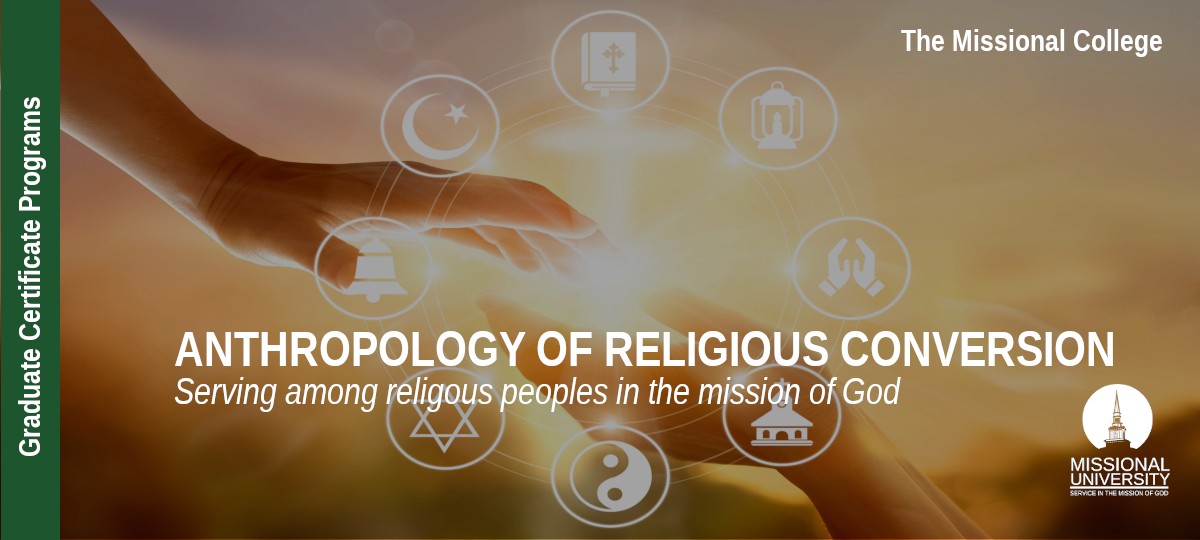
Online Graduate Certificate Program in
Anthropology of Religious Conversion
School: Missional College // Study Area: Serving Among Religious Peoples
☀ Totally Unique Program = only available at Missional University
Expand Your Intercultural Abilities Today!
REQUEST INFORMATION
Ready to learn more about the
Undergraduate Certificate in
Anthropology of Religious Conversion?
LEARN MORE NOW
Program Features
-
Integrated practicums allow you to gain valuable real-world experience
-
Learn from academic practitioners from around the world
-
Credits earned in this certificate program can apply to a Missional University Master's degree program
Course Effort
Course Length
Credits Required
Program Cost
What Will I Study?
We offer the most comprehensive approach to serving among religious peoples in the mission of God.
An exploration of the relationship between God who saves and humanity among the world’s diverse religious phenomena. The historical scope of this course begins with popular questions such as, “Do all paths lead to the same God?”, “Can salvation be obtained apart from the Christian Church?”, “What happens to people who never heard the Gospel of Jesus Christ?” and “Where is God in non-Christian religions?” and compares and evaluates the models commonly proposed to answer these questions.
Survey of a wide range of historical and ethnographic writings, selected to familiarize students with classical and contemporary issues studied by the anthropologists of religion. Students will examine how these issues are approached in terms of researchers' theoretical assumptions and social context. Topics include questions of embodiment, worship, language, materiality, ritual, space, authority, and globalization.
Exploration of cultural and social dynamics that cause individuals and groups to change, redefine, or reject their religious identities and commitments. Students will analyze ethnographic materials from different parts of the world to identify patterns and idiosyncrasies. Students will evaluate factors that intensify or decelerate religious change in contemporary cultures and examine methods to study religious change cross-culturally.
Choose three below:
Exploration of the differences between "folk" and "world" religions. Anthropological methods for understanding folk practices on their own terms and in relationship to other practices/perspectives is also covered.
Investigation of the historical development and core principles of Buddhism in India and Tibet. Students will analyze Buddhist scriptures and the thought of prominent thinkers such as Siddhartha Gautama, Nagarjuna, Padmasambhava and Tsongkhapa. The course will also examine Buddhism by placing it in dialogue with Christian thought.
Analysis of the historical development, core principles, and contemporary practices of Hinduism in the sociocultural and economic context of South Asia. The course also examines philosophical and theological thoughts of Hinduism in relation to Christian theology.
Introduction to Islam as a religion and investigation of what it means to be Muslim in culture, practice and ideas. Examining primary sources, secondary readings, and visual materials, students will gain a foundation in Islamic precepts and history, together with various cultural articulations. Additionally, students will analyze ways in which Muslim tradition is re/defined and applied in particular present-day socio-political contexts.
Introduction to the historical and contemporary expressions of Jewish culture through film, literature, poetry, and ethnography. Jewish religious texts, practices, and identities are examined within broader cultural and global contexts. Includes in-depth assessment of selected contemporary issues, such as Israeli-Palestinian conflict, Jewish diasporas in the Americas, discourse on “Jewishness”, and tensions between Ashkenazi, Sephardic, and Mizrahi Jews.
When Can I Get Started?
We offer multiple start dates each year to give you flexibility in your education, life and work schedules.
JANUARY
MARCH
MAY
AUGUST
OCTOBER
A Career in Navigating Cultural Difference
Is this Your Mission?
Missionary, Religious Leader, Community Worker, International Worker, Humanitarian Worker, Missional Team Leader, Global Director, Faith and Development Manager, Marketplace Ministry Worker, Children's and Youth Worker, Researcher
Request Information Now
How Much Will it Cost?
We offer tuition based upon country of residence. According to the Human Development Index, all countries around the world fall into one of four categories:
-
(Tier 1) - Very High Human Development
-
(Tier 2) High Human Development
-
(Tier 3) Medium Human Development
-
(Tier 4) Low Human Development
Our tiered global tuition makes higher education affordable for everyone world wide.

TIER COUNTRIES
100% Tuition
$395
per credit hour
3 credit course
$1185

TIER COUNTRIES
80% Tuition
$316
per credit hour
3 credit course
$948

TIER COUNTRIES
60% Tuition
$237
per credit hour
3 credit course
$711

TIER COUNTRIES
40% Tuition
$158
per credit hour
3 credit course
$474
Tiered tuition based on country of origin and scholarships available. Find your country of residence here for more information.
Tuition may be further reduced by participating in the Sponsorship Program.
